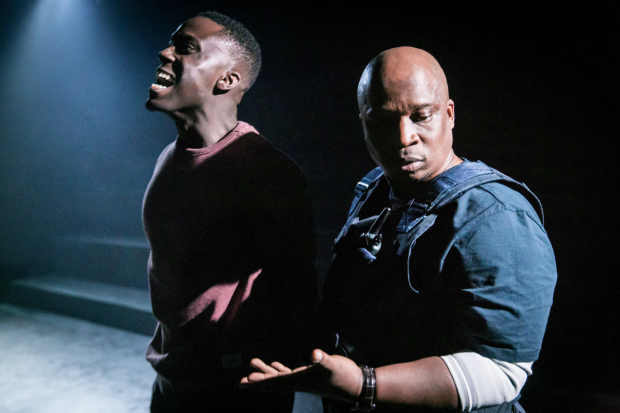I See You (Royal Court)
In exploring tensions more to do with roots, language and class than skin colour, Mongiwekhaya's autobiographical play tells an unfamiliar new story about South Africa. The show is also notable as the unflashy directorial debut of actress Noma Demuzweni, recent stand-in in Linda at the Court, and soon to play Hermione in the West End Harry Potter.
Ben is a privileged college kid, a black South African who's returned to Johannesburg after growing up in America. In a club, he meets Skinn, a white girl with pink hair, gold leggings, and an attitude. But when the sober Ben is accused by the police of drunk driving, the teenagers' cocky brio lands them on the wrong side of the law.
Officer Buthelezi is not having a good night: a restraining order is about to prevent him seeing his wife. He rages against it, but his superiors don't want any trouble – this corrupt police force can't be seen to be corrupt. His simmering anger has a history – he fought as an MK solider against apartheid – but it comes to boiling point this Friday night, and Ben bears the brunt.
What starts as a little messing around soon takes on a more serious complexion: Ben may be black, but Buthelezi still sees him a traitor against everything he struggled for. And it's not just his wealth: it's the fact that he no longer speaks Xhosa, his native tongue, and has adopted a Westernised name.
Mongiwekhaya can be heavy-handed as he tangles with thorny knots of class, racism, and identity. At its best, I See You illuminates unfamiliar societal tensions, but there are moments of exposition and accusation that clang. Still, he achieves an interesting balance: we're encouraged to at least understand the motivation behind the inexcusable police brutality, and while Ben is an innocent victim, his arrogant sense of martyrdom rankles. You see why he'd attract the ire of a generation who fought for his freedom.
I See You is largely about control. Buthelezi feels his hard-won control is being taken away (he shouts at his wife "you belong to me"), and seeks to impose his will elsewhere. Ben can't accept that there might be a situation where his money and education don't help. Even Skinn is engaged in a (pretty sketchily drawn) battle against a controlling older boyfriend. But not everyone can hold the reins all the time, Mongiwekhaya seems to imply, no matter how much their own peculiar brand of privilege convinces them they deserve to.
Desmond Dube as Buthelezi is outstanding: a still, somehow very present actor, yet you feel the ball of rage churning inside. Jordan Baker has a sparky energy as Skinn, but Bayo Gbadamosi as Ben never quite finds the depth to his character's resistance.
Dumezweni's stages the play with extreme simplicity – virtually set and prop free, with only changeable overhead lights to give a sense of place. It's a contrast to the specificity of the script, but allows for a fleet production; when Skinn and Ben talk on the phone, the actors physically interact as if chatting in the street. What you gain in freedom is lost, however, in atmosphere: there's a little sense of the menace of a confined police van, for instance. Although there are a few nail-biting moments, I See You is rarely very affecting – but as a window onto the power and identity struggles of another society, it's certainly a fascinating watch.
I see You is at the Royal Court till 26 March.











